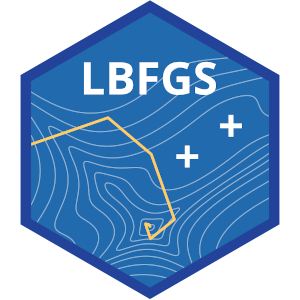Ecosyste.ms: Awesome
An open API service indexing awesome lists of open source software.
https://github.com/yixuan/LBFGSpp
A header-only C++ library for L-BFGS and L-BFGS-B algorithms
https://github.com/yixuan/LBFGSpp
l-bfgs l-bfgs-b lbfgs-solver lbfgsb-solver limited-memory optimization
Last synced: 27 days ago
JSON representation
A header-only C++ library for L-BFGS and L-BFGS-B algorithms
- Host: GitHub
- URL: https://github.com/yixuan/LBFGSpp
- Owner: yixuan
- License: mit
- Created: 2016-08-05T00:40:07.000Z (almost 8 years ago)
- Default Branch: master
- Last Pushed: 2024-03-10T04:17:22.000Z (3 months ago)
- Last Synced: 2024-03-10T05:26:02.948Z (3 months ago)
- Topics: l-bfgs, l-bfgs-b, lbfgs-solver, lbfgsb-solver, limited-memory, optimization
- Language: C++
- Homepage: https://lbfgspp.statr.me/
- Size: 881 KB
- Stars: 496
- Watchers: 17
- Forks: 99
- Open Issues: 4
-
Metadata Files:
- Readme: README.md
- Changelog: CHANGELOG.md
- License: LICENSE.md
Lists
- Awesome-SLAM - LBFGS++ - only C++ library for L-BFGS and L-BFGS-B algorithms (8. Tutorials / 8.4 Optimization Techniques)
- awesome-qc-programs - LBFGSpp
README
# LBFGS++ 
> **UPDATE on 2020-03-06**: **LBFGS++** now includes a new L-BFGS-B solver for
> box-constrained optimization problems. Check the example below for its usage.
**LBFGS++** is a header-only C++ library that implements the Limited-memory
BFGS algorithm (L-BFGS) for unconstrained minimization problems, and a modified
version of the L-BFGS-B algorithm for box-constrained ones.
The code for the L-BFGS solver is derived and modified from the
[libLBFGS](https://github.com/chokkan/liblbfgs)
library developed by [Naoaki Okazaki](http://www.chokkan.org/).
**LBFGS++** is implemented as a header-only C++ library, whose only dependency,
[Eigen](http://eigen.tuxfamily.org/), is also header-only.
## A Quick Example
To use **LBFGS++**, one needs to first define a functor to represent the
multivariate function to be minimized. It should return the objective function
value on a vector `x` and overwrite the vector `grad` with the gradient
evaluated on `x`. For example we could define the
[Rosenbrock function](https://en.wikipedia.org/wiki/Rosenbrock_function) in the
following way:
```cpp
#include
#include
#include
using Eigen::VectorXd;
using namespace LBFGSpp;
class Rosenbrock
{
private:
int n;
public:
Rosenbrock(int n_) : n(n_) {}
double operator()(const VectorXd& x, VectorXd& grad)
{
double fx = 0.0;
for(int i = 0; i < n; i += 2)
{
double t1 = 1.0 - x[i];
double t2 = 10 * (x[i + 1] - x[i] * x[i]);
grad[i + 1] = 20 * t2;
grad[i] = -2.0 * (x[i] * grad[i + 1] + t1);
fx += t1 * t1 + t2 * t2;
}
return fx;
}
};
```
Then we just need to set up parameters, create solver object,
provide initial guess, and then run the minimization function.
```cpp
int main()
{
const int n = 10;
// Set up parameters
LBFGSParam param;
param.epsilon = 1e-6;
param.max_iterations = 100;
// Create solver and function object
LBFGSSolver solver(param);
Rosenbrock fun(n);
// Initial guess
VectorXd x = VectorXd::Zero(n);
// x will be overwritten to be the best point found
double fx;
int niter = solver.minimize(fun, x, fx);
std::cout << niter << " iterations" << std::endl;
std::cout << "x = \n" << x.transpose() << std::endl;
std::cout << "f(x) = " << fx << std::endl;
return 0;
}
```
The example can then be compiled and run.
```bash
$ g++ -I/path/to/eigen -I/path/to/lbfgspp/include -O2 example.cpp
$ ./a.out
23 iterations
x =
1 1 1 1 1 1 1 1 1 1
f(x) = 1.87948e-19
```
You can also use a different line search algorithm by providing a second template parameter
to `LBFGSSolver`. For example, the code below illustrates the bracketing line search algorithm
(contributed by [@DirkToewe](https://github.com/DirkToewe)).
```cpp
int main()
{
const int n = 10;
// Set up parameters
LBFGSParam param;
param.epsilon = 1e-6;
param.max_iterations = 100;
// Create solver and function object
LBFGSSolver solver(param);
Rosenbrock fun(n);
// Initial guess
VectorXd x = VectorXd::Zero(n);
// x will be overwritten to be the best point found
double fx;
int niter = solver.minimize(fun, x, fx);
std::cout << niter << " iterations" << std::endl;
std::cout << "x = \n" << x.transpose() << std::endl;
std::cout << "f(x) = " << fx << std::endl;
return 0;
}
```
## Box-constrained Problem
If the parameters to be optimized have simple bounds, then the
L-BFGS-**B** solver class `LBFGSBSolver` can be used.
The code is very similar to that of `LBFGSSolver`. Below is the same Rosenbrock
example, but we require that all variables should be between 2 and 4.
```cpp
#include
#include
#include // Note the different header file
using Eigen::VectorXd;
using namespace LBFGSpp;
class Rosenbrock
{
private:
int n;
public:
Rosenbrock(int n_) : n(n_) {}
double operator()(const VectorXd& x, VectorXd& grad)
{
double fx = 0.0;
for(int i = 0; i < n; i += 2)
{
double t1 = 1.0 - x[i];
double t2 = 10 * (x[i + 1] - x[i] * x[i]);
grad[i + 1] = 20 * t2;
grad[i] = -2.0 * (x[i] * grad[i + 1] + t1);
fx += t1 * t1 + t2 * t2;
}
return fx;
}
};
int main()
{
const int n = 10;
// Set up parameters
LBFGSBParam param; // New parameter class
param.epsilon = 1e-6;
param.max_iterations = 100;
// Create solver and function object
LBFGSBSolver solver(param); // New solver class
Rosenbrock fun(n);
// Bounds
VectorXd lb = VectorXd::Constant(n, 2.0);
VectorXd ub = VectorXd::Constant(n, 4.0);
// Initial guess
VectorXd x = VectorXd::Constant(n, 3.0);
// x will be overwritten to be the best point found
double fx;
int niter = solver.minimize(fun, x, fx, lb, ub);
std::cout << niter << " iterations" << std::endl;
std::cout << "x = \n" << x.transpose() << std::endl;
std::cout << "f(x) = " << fx << std::endl;
return 0;
}
```
Note that we also allow infinite values for the lower and upper bounds.
In such cases one can define `ub[i] = std::numeric_limits::infinity()`,
for example.
## Documentation
The [API reference](https://lbfgspp.statr.me/doc/) page contains the documentation
of **LBFGS++** generated by [Doxygen](https://www.doxygen.nl/).
## License
**LBFGS++** is an open source project under the MIT license.